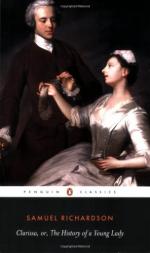‘The English writers of Tragedy,’ says Mr. Addison,* ’are possessed with a notion, that when they represent a virtuous or innocent person in distress, they ought not to leave him till they have delivered him out of his troubles, or made him triumph over his enemies.
* Spectator, Vol. I. No. XL.
’This error they have been led into by a ridiculous doctrine in modern criticism, that they are obliged to an equal distribution of rewards and punishments, and an impartial execution of poetical justice.
’Who were the first that established this rule, I know not; but I am sure it has no foundation in nature, in reason, or in the practice of the ANTIENTS.
’We find that good and evil happen alike unto all men on this side the grave: and as the principal design of tragedy is to raise commiseration and terror in the minds of the audience, we shall defeat this great end, if we always make virtue and innocence happy and successful.
’Whatever crosses and disappoints a good man suffers in the body of the tragedy, they will make but small impression on our minds, when we know, that, in the last act, he is to arrive at the end of his wishes and desires.
’When we see him engaged in the depth of his afflictions, we are apt to comfort ourselves, because we are sure he will find his way out of them, and that his grief, however great soever it may be at present, will soon terminate in gladness.
’For this reason, the antient writers of tragedy treated men in their plays, as they are dealt with in the world, by making virtue sometimes happy and sometimes miserable, as they found it in the fable which they made choice of, or as it might affect their audience in the most agreeable manner.
’Aristotle considers the tragedies that were written in either of those kinds; and observes, that those which ended unhappily had always pleased the people, and carried away the prize, in the public disputes of the state, from those that ended happily.
’Terror and commiseration leave a pleasing anguish in the mind, and fix the audience in such a serious composure of thought, as is much more lasting and delightful, than any little transient starts of joy and satisfaction.
’Accordingly, we find, that more of our English tragedies have succeeded, in which the favourites of the audience sink under their calamities, than those in which they recover themselves out of them.
’The best plays of this kind are The Orphan, Venice Preserved, Alexander the Great, Theodosius, All for Love, Oedipus, Oroonoko, Othello, &c.
’King Lear is an admirable tragedy of the same kind, as Shakespeare wrote it: but as it is reformed according to the chimerical notion of poetical justice, in my humble opinion it has lost half its beauty.




